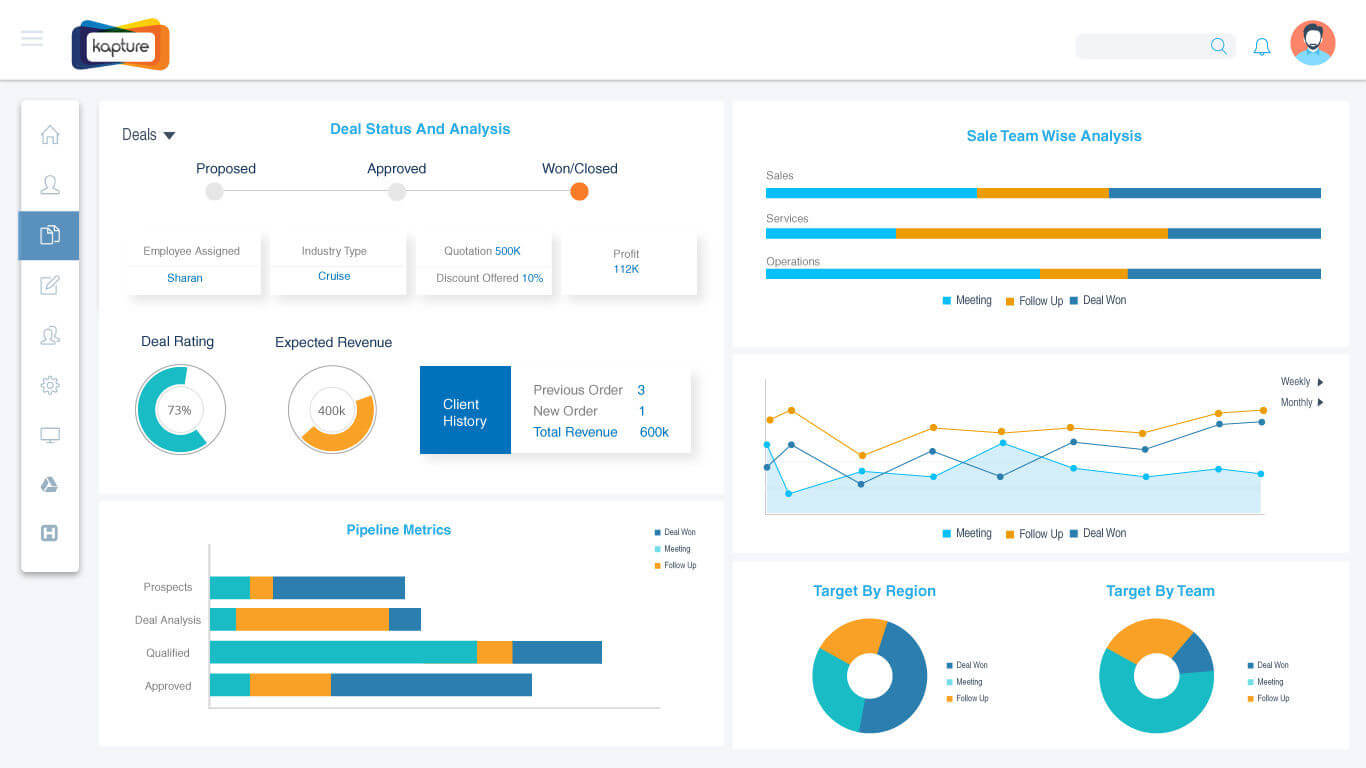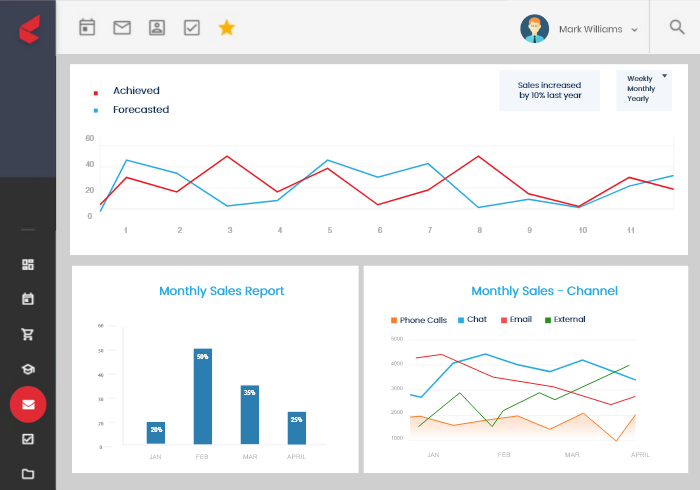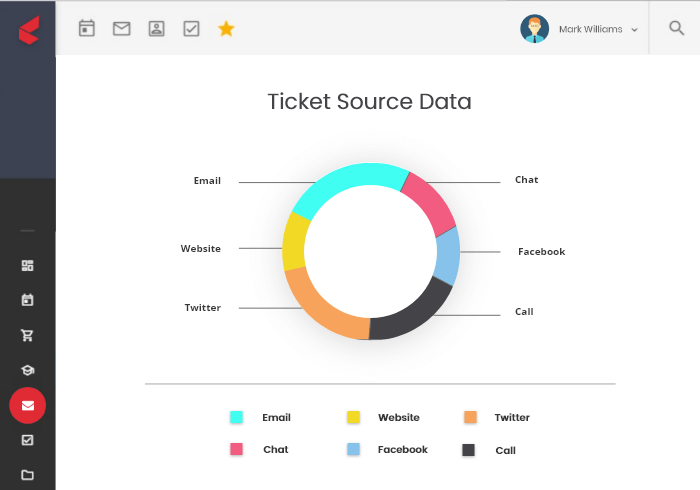Retail-CRM is more concerned with promoting frequent occurrences of repeat purchases in a business environment giving service to customers measured on any scale.
You may gather information about your customer from the database and use the data to sell more, provide customer satisfaction, market persuasively, do cost savings, and enhance organizational performance overall using a retail CRM software with a sophisticated and responsive design.
Retail CRMs let retailers figure out when it’s best to contact a particular client again, as well as what that customer is most likely looking for.
Real-time analytics and statistics are available in retail CRM software to help you manage individual customers.
Retail CRM: What is it?
The Retail Customer Relationship Management system enables us to collect and store customer information and profile of customers, such as their most recent purchase, important dates, phone numbers, and other contact details.
This also aids you in identifying demand and generating more revenue, as well as improving your consumers’ experience at your store.
Automated data collection or manual entry can provide a multitude of useful data, which you can use to improve your business and make it more efficient and profitable.
How Does CRM Work in the Retail Sector?

Consumers are more aware of items today, as well as more demanding. They know exactly what they want and where they can get it.
Retailers face a big difficulty in keeping their customers’ loyalty. Customer behavior is influenced by marketing, social media platforms, and improved accessibility.
CRM gives us an edge to cater to the audience effectively and efficiently depending on their requirements.
A retail customer relationship management system should have the following benefits given this current digitalization:
- Collects and researches consumer behavior and sales patterns by gathering and analyzing sales patterns over a period.
- Capitalizing on diversification of shops of all sizes whether it be medium to large scale making a digital presence.
- Aids in the storage of client data, allowing you to forecast future trends, develop tactical strategies, and make key decisions.
- Possibility of more intentional advertising depending on repeat customers that give you vital information about their preferences.
- Delivers individualized customer service and long-term customer retention with the creation of tailored features.
1. Influence of CRM in the Retail Sector
The influence of CRM in the retail sector is visible in all areas whether it be kiosks, departmental/convenient stores, or stores related to major brands. It makes the routine operations easy to handle and saves a lot of time.
We’ve compiled a list of seven benefits of implementing a CRM that can assist your retail business:
2. Segregation of Clustered Data
In an era, such as ours where data has revolutionized digitalization, maintaining such data under several heads becomes stressful.
But it is of utmost importance to segregate such data to deep-dive and learn about customer behavior and their buying pattern.
In retail, as we maintain such a database it becomes possible for us to develop segments, as you’ll be able to see where your customers fit in and what their expectations are, and you’ll be able to devise methods to best serve them.
3. Monitoring Accuracy

It becomes technically easy to monitor the operations where you can acquire required client data with the aid of a CRM solution. You can arrange your campaigns in a rather concentrated and methodical way using this information.
For instance, if your company knows a customer that has browsed at a product category or opted for a specified service via your website, and wants to do a return then the required action will be taken against that item given the ‘reason of return’, and if it falls under your policy.
It improves the accuracy over time when you constantly develop such data in order to solve customer requirements, grievances, and issues that they generally face.
4. Drawing Loyalty
Once you plan your engagement strategy, your CRM should be able to distinguish your customers to decide who is qualified for your loyalty program‘s various benefits, levels, and awards.
Additionally, you can reward long-term clients with points and prizes, which will help you gain their loyalty. Loyalty will bring you devoted customers, which will increase your sales and profits.
Although attracting new clients is often a priority, customer loyalty should be rewarded as well. In fact, after you’ve gained a buyer and are willing to focus on fostering loyalty, a retail CRM can help you the most.
A CRM acts as a guide for figuring out what kinds of promotions your customers are really inclined to answer to, as well as keeping a record of how they’ve responded to your various offers and services.
5. Tailored Personalization
Personalization in retail harnesses uniqueness for your business as customers find the product more suitable and appropriate for their use.
It can be a tailored message or a feature or even a promotion based on their previous purchase.
This tracking of their purchase history helps a business curate marketing strategies to provide services based on recommendations on a personal level that brings the customer feel closer to the brand.
It makes the whole point of customer experience relevant as they seek products and services from the same brand.
Related read: Strategy to Deliver a More Personalized Customer Service
6. Presence on Multiple-Channel

Availability on multiple channels has become a necessity for catering to a larger audience.
And in retail, it is important that your presence is there where your customers exist.
It is true to the bones that a CRM helps you with a unified repository to make the whole communication channel work effectively, where one just needs to utilize the knowledge to improve and identify who you need to keep in touch with and ensure that significant customers don’t slip through the cracks.
7. Co-operate Internally
When you have so many departments and staff operating at the same time, it’s difficult to manage a retail business of any size.
As a result, collaboration and teamwork are essential, which can only be achieved with the help of a powerful CRM.
It allows every individual to update their task boards and clients with whom they are working, allowing them to comprehend and not override a scheduled action, providing them with a certain level of clarity.
It helps with time management and deliverables that must be completed on a specific day.
8. Enhancing Strategy
The whole purpose of a CRM is to contribute to formulating a better strategy for your business so that you can perform better in the near future understanding pattern of your competitors as well as your customers.
The whole point of taking note of every detail is to determine and answer possible questions that may arise while learning the behavior, preferences, and price in order to generate more sales records and profitability.
Related Read: Direct to Consumer Strategy
Strategies to Get the Most Out of Your CRM
- Constantly implement and improve changes related to customer behavior and their buying patterns.
- Update and inform centrally whenever there’s a switch in customer information whether it be related to personal contact, change in demographics, or card details.
- Provide personalization and customization giving an intricate customer experience, giving them proper recommendations.
- Develop marketing tactics to track the right audience and potential buyers to grasp their attention and curate messages based on their website visit.
- Identify assets to leverage the inventory system so that the sales team can maintain stock options available and unavailable.
Therefore, it is important in retail to have a prominent CRM been installed in their systems to integrate better productivity- enhancement in operations, time management, developing insights on customer behavior, and then generating a better sales record in terms of revenue.
Customers are the center of a successful retail business and to provide service to them might sound easy, but it isn’t.
Today customers want products and services to be made according to them, so every time you reach out to a customer your approach should be modified in order to read in between the lines.
It is significant in the retail business to be able to sell products even before the customer has made a decision, it’s like knowing the direction from beforehand where they are going to point.
,
,
,
,
,
,
,
,
,
,
,
,
,








